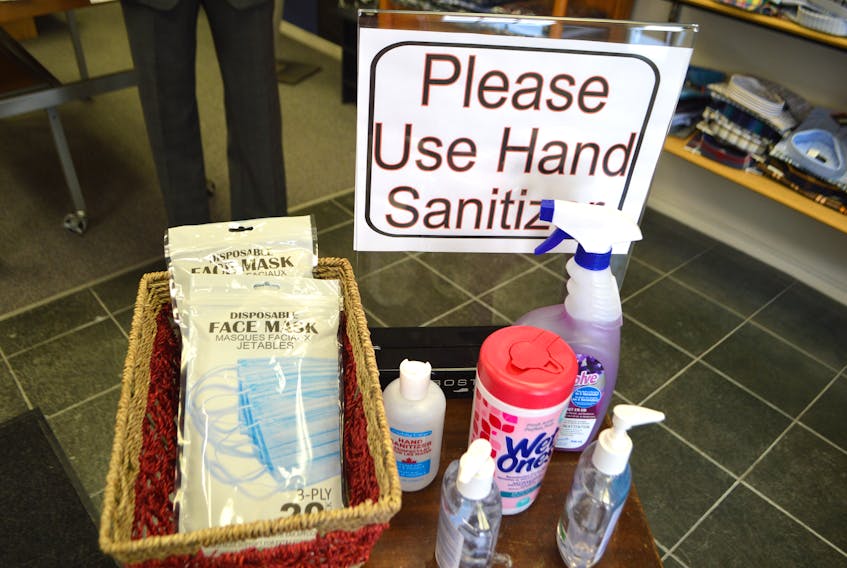SYDNEY — As of Oct. 22 there were eight people in the Cape Breton Regional Municipality in quarantine under the Quarantine Act.
“These are individuals who have entered Canada from another country and are required to self-isolate for 14 days under the federal Quarantine Act through Public Health Agency of Canada,” said Desiree Magnus, spokeswoman for the Cape Breton Regional Police Service.
When travellers who have recently entered Canada return to the local area, Magnus said police receive a list from Public Health identifying mandatory quarantine. The police service is asked to verify that the person or persons are following isolation requirements.
So far in the pandemic, Magnus said the Public Health Agency of Canada has referred the names of 213 people in the CBRM who travelled outside Canada, required to quarantine.
“All have complied, and we have not laid any charges,” she added.
As of Oct. 22, Nova Scotia RCMP received 6,405 names from the Public Health Agency of Canada of people required to quarantine under the act. Cpl. Lisa Croteau said as of Oct. 22, a total of 308 people were still in quarantine.
THE QUARANTINE ACT
The Government of Canada said under the Quarantine Act, persons entering Canada must quarantine for 14-days. These individuals must provide contact information as requested and monitor themselves for symptoms subject to any order under the act imposing isolation or quarantine requirements upon entry.
The compliance is subject to verification and enforcement. Those in violation may face transfer to a quarantine facility as well as fines and/or imprisonment.
In information provided by the Public Health Agency of Canada, quarantine orders began with repatriated people from cruise ships back in March and April, and then was made mandatory for travellers coming into the country.
There is still a travel advisory in place by Public Health, advising Canadians against travelling outside the country.
Public Health Canada says the high number in quarantine in Nova Scotia this time of the year would most likely be people returning after an extended stay outside the country for the summer, most likely after the end of a contract or other work-related reason.
For people entering the country without a place to quarantine, there are federal designated sites.
“They cannot officially travel but as a Canadian citizen they have a right to come into their country,” a Public Health official said. “And the Canadian government has an obligation to protect those residents, that’s why designated quarantine sites are set up.”
As of Oct.12, a total of 126 travellers in Canada were staying in one of the federally designated quarantine facilities in the country and 3,922 travelers had been accommodated in one these specific quarantine sites since the beginning.
VIOLATIONS IN THE CBRM
Travelers entering Nova Scotia from outside the Atlantic Bubble are required to self-isolate for 14 days. They are required to fill out paperwork and complete daily check-ins. If there are concerns over compliance Public Health refers their name to the police agency of jurisdiction to follow-up. Five of those requests have been forwarded to the Cape Breton Regional Police Service but all have checked out to be complying and no charges were laid.
As of Oct. 23, the CBRPS has issued 108 violations under the provincial State of Emergency: five under the Emergency Management Act for entering prohibited areas, closed beaches and parks. A total of 103 violations have been laid under the Health Protection Act, three for not self-isolating and the remainder for not social distancing.
The most recent ticket issued was Sept. 25 for an individual reported to not be self-isolating, after arriving back in Sydney from outside of the Atlantic Bubble.
VIOLATIONS ACROSS THE PROVINCE
Since the beginning of the pandemic, Nova Scotia RCMP has charged 234 people under the Health Protection Act, 53 people under the Emergency Management Act, and five people under the Quarantine Act.
So far in October, Nova Scotia RCMP has charged 13 people under the Health Protection Act.
Heather Fairbairn, a spokeswoman for the Department of Justice, said as of Oct. 23, 2020, overall in Nova Scotia the department is aware that police agencies in the province had issued at least 744 summary offence tickets for failure to comply with sections of the Health Protection Act orders and the Emergency Management Act directive.
“Our statistics represent all electronic tickets issued by police in real time, and would also include any paper tickets that have been entered into the database to date,” she stated in an email response to questions
COVID-19 IN NOVA SCOTIA
As of Oct. 24, Nova Scotia has six active cases of COVID-19. Three new cases were identified Friday, Oct. 23, all related to travel outside Atlantic Canada. Public Health reported wo cases are in the central zone and the individuals have been self-isolating. One case was diagnosed and recovered in another province but is a Nova Scotia resident in the eastern zone.
To date, Nova Scotia has 108,287 negative test results, 1,100 positive COVID-19 cases and 65 deaths. No one is currently in hospital. Cases range in age from under 10 to over 90. A total of 1,029 cases are now resolved. Cases have been identified in all parts of the province.
On March 22, the province declared a state of emergency to help contain the spread of COVID-19. The state of emergency has been extended to Nov. 1.









